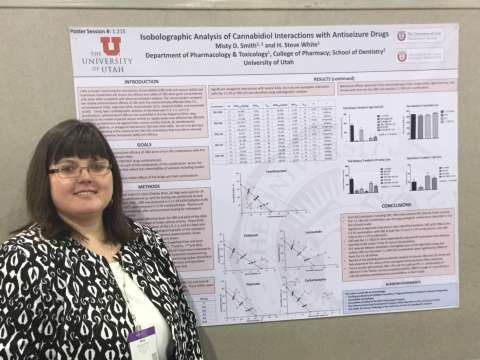Targeted Research Program
Since 2004, the targeted research program has been supporting a wide range of topics.
- Mood disorders (2004-2010)
- Seniors (2007-2010)
- Health outcomes (2008-2011)
- Youth (2009-2013)
- Women (2010-2013)
- Morbidity and mortality (2011-2015)
- Cognitive aspects (2011-2013)
- Veterans (2014)
- Cannabinoids (2014 - 2019)
- Sudden unexpected death in epilepsy (SUDEP): To identify ways to prevent SUDEP. This program is partnership with our SUDEP Program.
Targeted Research Initiative for Morbidity and Mortality in Epilepsy
The Targeted Research Initiative for Morbidity and Mortality in Epilepsy supports research that generates initial data leading to more extensive projects that will generate knowledge that will ultimately improve the lives of persons with epilepsy. This initiative recognizes the need for research and new insights into these scientific areas.
The broad focus of the morbidity portion of this program includes: identification of somatic comorbidities in epilepsy that occur more than expected among controls, including but not limited to diabetes, gastrointestinal bleeding, chronic lung disease, congenital cardiac abnormalities, heart failure, and pneumonia; and associations between somatic comorbidities in epilepsy and epilepsy outcomes, including quality of life in epilepsy, seizure remission, stigma and other outcomes.
The mortality portion of the program is focused upon potentially preventable causes of death in epilepsy, such as accidents, suicide and SUDEP. Applicants are encouraged to examine risk factors for these causes of death in epilepsy; as well as interventions to decrease the presence of risk factors for these causes of death where risk factors have been identified.
Previous Award Recipients
Gordon Buchanan, M.D., Ph.D.
Norepinephrine & Serotonin in Seizure-induced Respiratory Arrest and Death
Award recipient: Gordon Buchanan, M.D., Ph.D.
The University of Iowa, Iowa City, IA
SUDEP is the leading cause of death in patients with refractory epilepsy. Seizure-induced respiratory arrest (SIRA) is frequently implicated in SUDEP. The neurotransmitter serotonin has been implicated in SUDEP, especially in the respiratory consequences of seizures. Other neurotransmitters, such as norepinephrine (NE), can also be released during seizures and influence breathing. Preliminary data suggest that fluoxetine, a selective serotonin reuptake inhibitor that also has activity at NE receptors is able to prevent SIRA and death in mice that do not have serotonin neurons in the brain. This suggests a role for NE receptor activation.
Here we propose to further characterize a role of NE in SIRA and death in a mouse seizure model. Previous work shows that many mice that experience such seizures suffer SIRA and die. It is also known that pharmacological up-regulation of the serotonin system prior to the seizure can prevent SIRA and death. We propose to use a similar approach to examine a role for NE in SIRA and death. Gaining a better understanding of ways to support breathing and prevent death following seizures in animal models that are relevant to SUDEP may reveal preventive strategies to employ in patients with epilepsy.
Targeted Research Initiative for Research Regarding Cannabinoids and Epilepsy (TRICE)
Previous TRICE Award Recipients
Rama Maganti, M.D.
Cannabidiol, mTOR and the Excitation/Inhibition Balance in Epilepsy
Award recipient: Rama Maganti, M.D.
University of Wisconsin-Madison, Madison, WI
Cannabidiol (CBD) is a major component in marijuana believed to offer anticonvulsant effects in certain patient groups with epilepsy. CBD is believed to have neuroprotective effects, and limited experimental studies suggest that it may work by reducing over-excitation cause by glutamate or by improving sleep. Nonetheless, the mechanism linking CBD to these measures or other mechanisms remains non-compelling and/or insufficient. The neurological mechanism is likely complex, yet mechanistic understanding would inform CBD dosing and patient population selection.
To unveil the mechanism behind CBD’s potential as an anti-epileptic, we propose to investigate major metabolic signaling pathways critical to neuronal health and survival and we will undertake a thorough investigation of CBD action on the excitatory/inhibitory balance in the brain. To do so we will employ various mouse models of epilepsy to assess electrophysiological changes and sleep outcomes linked to CBD use. Understanding the mechanism behind CBD’s anticonvulsant potential will inform neurologists as to the appropriate patient groups and epilepsy syndromes which would potentially be alleviated by CBD.
Angela Birnbaum, Ph.D.
Pharmacokinetic and Cognitive Side Effects of Cannabidiol in Adult Patients
Award recipient: Angela Birnbaum, Ph.D.
University of Minnesota, Minneapolis, MN
Extensive media coverage of dramatic control of intractable seizures, especially in children with Dravet’s syndrome, has led to state laws allowing various preparations derived from marijuana to be used in patients. These laws have been adopted with little being known about how the various substances are handled by the body (pharmacokinetics), how safe they are, if they interact with other medications, and how much is needed to control seizures. A high grade product is available in Minnesota making it possible for a detailed study to evaluate how cannabidiol (CBD) is handled in the body and what effect it has on thinking and mood.
The proposed study will give adult patients with intractable epilepsy a pure form of CBD to evaluate its pharmacokinetics and side effects during three scenarios: with food, fasting, and during chronic therapy providing data needed to create dosing and treatment guidelines. The long-term goal of this study is to provide information about CBD that will help design larger, longer term studies. This study will also inform later studies that may use different formulations of cannabinoids (varying amounts of THC and CBD).
Misty Smith, Ph.D.
Analysis of Cannabidiol Interactions with Antiseizure Drugs
Award recipient: Misty Smith, Ph.D.
University of Utah, Salt Lake City, UT

Misty Smith presented a poster on her project at the 2015 American Epilepsy Society Annual Meeting.
Resources
Epilepsy Centers
Epilepsy centers provide you with a team of specialists to help you diagnose your epilepsy and explore treatment options.
Epilepsy Medication
Find in-depth information on anti-seizure medications so you know what to ask your doctor.
Epilepsy and Seizures 24/7 Helpline
Call our Epilepsy and Seizures 24/7 Helpline and talk with an epilepsy information specialist or submit a question online.
Tools & Resources
Get information, tips, and more to help you manage your epilepsy.



